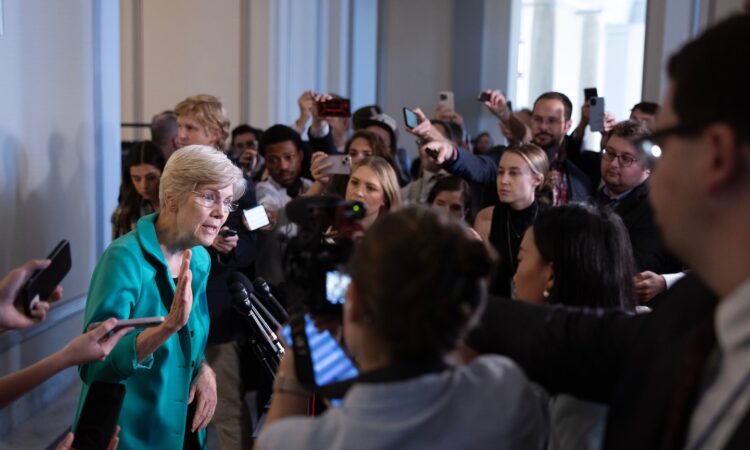
The proposed $35.3 billion megamerger of Capital One and Discover stands to turn the combined company into the largest credit card lender in the United States, according to data from Bloomberg Intelligence. It would unite Capital One’s banking and card businesses with similar assets at Discover, including its payment network, which competes with the likes of Visa and Mastercard.
Top executives at Capital One and Discover have said they expect the deal to close in late 2024 or early 2025, pending approval from U.S. regulators, including the Treasury Department and the Federal Reserve. In scrutinizing the deal, federal officials must weigh whether it benefits competition and consumers, at a time when President Biden has sought to ratchet up enforcement of antitrust laws.
With that process set to begin soon, Warren and other top Democrats — including Reps. Alexandria Ocasio-Cortez (N.Y.), Ayanna Pressley (Mass.) and Katie Porter (Calif.) — described the merger as “bad for consumers,” pointing to the fact that the industry already is dominated by six major bank holding companies.
“President Biden has made fighting concentration in the banking sector and other industries a key priority of his administration,” the Democrats wrote in the letter, shared early with The Washington Post. They called the upcoming merger review “one of the most important tests of the efforts to prevent harmful bank consolidation” facing the Biden administration.
“To protect consumers and financial stability, we urge you to block this merger and strengthen your proposed policy statement to prevent harmful deals in the future,” they wrote.
The early opposition underscores the tough political task facing Capital One and Discover as they start trying to sell their deal to federal regulators. While Congress does not have a final say on the transaction, lawmakers possess the power to pressure or probe the companies, including by demanding their testimony on Capitol Hill.
Since announcing the merger last week, Capital One and Discover have defended their deal as beneficial to customers and shareholders alike, expressing confidence about their ability to obtain government approval. Richard Fairbank, the chief executive of Capital One, told investors on a call last week that the deal would “position us to compete more effectively against some of the largest banks and payment companies in the United States.”
Under Biden, though, federal merger reviews have been especially tough, as the administration has sought to crack down on consolidation in a wide range of industries. In recent years, the government has challenged or blocked major deals involving major airlines, biotech firms and technology giants, and regulators on Monday filed a lawsuit that aims to prevent two grocery chains — Albertsons and Kroger — from combining.
Biden, meanwhile, has been especially vocal in criticizing large companies that expand their corporate footprints, arguing that the loss of consumer choice has raised prices throughout the economy. In 2021, he signed a sprawling executive order on antitrust that took explicit aim at the financial sector: The directive called on federal officials to “update guidelines on banking mergers to provide more robust scrutiny of mergers” and ensure that “Americans have choices among financial institutions.”
Since then, though, the U.S. government has not fully updated those rules, while approving “almost every merger application” it has received in the past three years, according to the Democratic lawmakers, who pointed to Treasury Department data. Warren and her colleagues said the leniency at the Office of the Comptroller of the Currency (OCC), which oversees such deals, stands in stark contrast to regulators’ own warnings that they must halt further consolidation.
“It is critical that the OCC strengthen its proposed policy statement to ensure that future mergers do not harm consumers and the broader economy,” the Democrats said.





